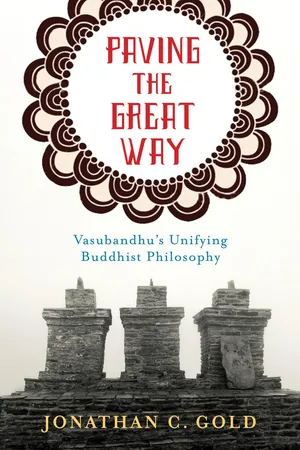
- English
- ePUB (mobile friendly)
- Available on iOS & Android
About this book
The Indian Buddhist philosopher Vasubandhu (fourth–fifth century C.E.) is known for his critical contribution to Buddhist Abhidharma thought, his turn to the Mahayana tradition, and his concise, influential Yogacara–Vijñanavada texts. Paving the Great Way reveals another dimension of his legacy: his integration of several seemingly incompatible intellectual and scriptural traditions, with far-ranging consequences for the development of Buddhist epistemology and the theorization of tantra.
Most scholars read Vasubandhu's texts in isolation and separate his intellectual development into distinct phases. Featuring close studies of Vasubandhu's Abhidharmakosabhasya, Vyakhyayukti, Vimsatika, and Trisvabhavanirdesa, among other works, this book identifies recurrent treatments of causality and scriptural interpretation that unify distinct strands of thought under a single, coherent Buddhist philosophy. In Vasubandhu's hands, the Buddha's rejection of the self as a false construction provides a framework through which to clarify problematic philosophical issues, such as the nature of moral agency and subjectivity under a broadly causal worldview. Recognizing this continuity of purpose across Vasubandhu's diverse corpus recasts the interests of the philosopher and his truly innovative vision, which influenced Buddhist thought for a millennium and continues to resonate with today's philosophical issues. An appendix includes extensive English-language translations of the major texts discussed.
Frequently asked questions
- Essential is ideal for learners and professionals who enjoy exploring a wide range of subjects. Access the Essential Library with 800,000+ trusted titles and best-sellers across business, personal growth, and the humanities. Includes unlimited reading time and Standard Read Aloud voice.
- Complete: Perfect for advanced learners and researchers needing full, unrestricted access. Unlock 1.4M+ books across hundreds of subjects, including academic and specialized titles. The Complete Plan also includes advanced features like Premium Read Aloud and Research Assistant.
Please note we cannot support devices running on iOS 13 and Android 7 or earlier. Learn more about using the app.
Information
Table of contents
- Cover
- Title page
- Copyright
- Dedication
- Contents
- Acknowledgments
- Abbreviations
- 1. Summarizing Vasubandhu: Should a Buddhist Philosopher Have a Philosophy?
- 2. Against the Times: Vasubandhu’s Critique of His Main Abhidharma Rivals
- 3. Merely Cause and Effect: The Imagined Self and the Literalistic Mind
- 4. Knowledge, Language, and The Interpretation of Scripture: Vasubandhu’s Opening to the Mahāyāna
- 5. Vasubandhu’s Yogācāra: Enshrining the Causal Line in the Three Natures
- 6. Agency and The Ethics of Massively Cumulative Causality
- Conclusion: Buddhist Causal Framing for the Modern World
- Appendix A. Against the Existence of the Three Times
- Appendix B. Brief Disproof of the Self
- Appendix C. Discussion of “View” (Drsti)
- Appendix D. Against the Eternality of Atoms (Paramānu)
- Appendix E. The Proper Mode of Exposition on Conventional and Ultimate
- Appendix F. The Twenty Verses on Appearance and Memory
- Appendix G. The Three Natures Exposition
- Notes
- Bibliography
- Index